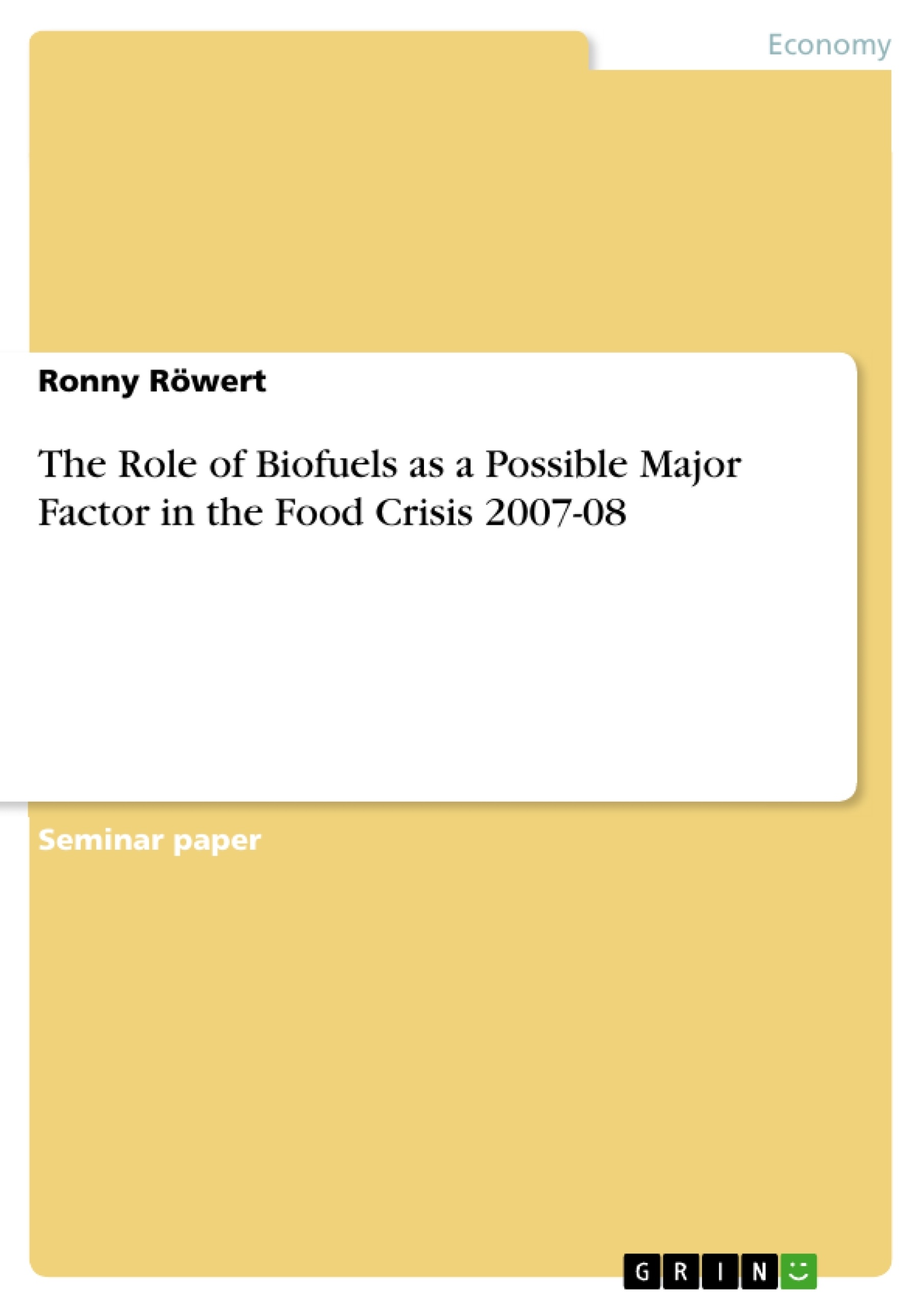Between 2005 and 2008 the prices of most major cereals almost doubled or tripled, causing violent food riots all over the world. World Bank President Robert B. Zoellick emphasised in mid-April 2008, at the peak of the price surge, that “a doubling of food prices over the last three years could potentially push 100 million people in low-income countries deeper into poverty” (WB 2008).
This price rise took place in a very short period of time and especially the rapid increase between January 2007 and April 2008 (and the immediate decline afterwards) needed an explanation. A lot of rash statements were made meanwhile and immediately after the food crisis, coming from the media, politicians and lobbies. Most of the non-academic commentaries lacked differentiation and evidence in the attempt to explain the reasons and factors which caused the price spike. Western policy makers insisted on explaining that the developing and emerging countries themselves were responsible for increasing prices “due to poor agricultural policies and changing eating habits in developing nations” as argued by German Chancellor Merkel (Reuters 2008). The media and different pro-poor lobby groups used biofuels or speculation as scapegoats for the entire price rise while the academic literature discussed the weight of these factors and added others like global economic growth, higher energy prices, declining stocks, adverse weather events and decline in agricultural investment (Elliot 2008). This paper aims to summarise the scale of influence that different factors had during the price surge, dealing especially with biofuels as a possible major cause of the crisis. Therefore, it is necessary to first examine the characteristics of the price surge. Secondly, the role of every single suspicious factor will be evaluated, and finally, the reasons behind the appearance of the most important factor will be investigated.
Inhaltsverzeichnis (Table of Contents)
- Introduction
- The Anatomy of the Price Hike
- Possible Causes of the Food Price Crisis 2007-08
- Strong growth in demand
- Financial Speculation
- Depreciation of the Dollar
- Escalating Oil Prices
- Trade Shocks: Adverse Weather, Export Bans and Import Surges
- Biofuels
- Quantifying the Impact of Biofuels on Rising Food Prices
- Reasons Behind the Escalating Demand for Biofuels
- Concluding remarks
Zielsetzung und Themenschwerpunkte (Objectives and Key Themes)
This paper aims to provide a comprehensive analysis of the food price crisis of 2007-08, focusing on the role of biofuels as a possible major cause. The paper examines the characteristics of the price surge, evaluates the contribution of various factors, and investigates the reasons behind the escalating demand for biofuels.
- The surge in global food prices during 2007-08.
- The role of biofuels in driving up food prices.
- Other factors contributing to the food price crisis, such as economic growth, speculation, and weather shocks.
- The impact of rising food prices on developing countries.
- Policy implications for mitigating future food price volatility.
Zusammenfassung der Kapitel (Chapter Summaries)
The paper begins by outlining the significant increase in global food prices during 2007-08, highlighting the rapid rise and subsequent decline in prices. Chapter 2 examines the characteristics of the price surge, comparing recent trends with historical data. Chapter 3 explores various factors that contributed to the food price crisis, including strong economic growth, financial speculation, and trade shocks. Chapter 4 specifically focuses on the impact of biofuels on rising food prices, analyzing their contribution to the overall price surge. Chapter 5 delves into the reasons behind the increasing demand for biofuels, examining the factors driving their production and consumption.
Schlüsselwörter (Keywords)
This paper explores the complex interplay of factors driving the food price crisis of 2007-08, focusing specifically on the role of biofuels. The analysis considers key themes such as global food demand, agricultural commodity markets, financial speculation, and trade policies. The paper examines the impacts of rising food prices on developing countries and proposes potential policy implications for mitigating future price volatility.
Frequently Asked Questions
What caused the global food crisis of 2007-08?
The crisis was caused by a combination of factors including escalating oil prices, financial speculation, adverse weather, and the rising demand for biofuels.
How did biofuels contribute to rising food prices?
The diversion of food crops (like corn and cereals) to biofuel production reduced the supply available for food, driving up market prices significantly.
Why did demand for biofuels escalate during this period?
Policy incentives in Western countries aimed at energy security and reducing carbon emissions led to a rapid increase in biofuel production mandates.
What was the impact of the crisis on low-income countries?
According to the World Bank, the doubling of food prices pushed approximately 100 million people deeper into poverty and caused food riots globally.
What role did oil prices play in the food crisis?
Higher oil prices increased the costs of agricultural production (fertilizers, machinery) and transportation, while also making biofuels a more attractive alternative.
Was financial speculation a major factor in the price surge?
The paper examines speculation as a "scapegoat" used by some, but also analyzes its actual weight alongside fundamental market factors like declining stocks.
- Citar trabajo
- Ronny Röwert (Autor), 2011, The Role of Biofuels as a Possible Major Factor in the Food Crisis 2007-08, Múnich, GRIN Verlag, https://www.grin.com/document/168272



